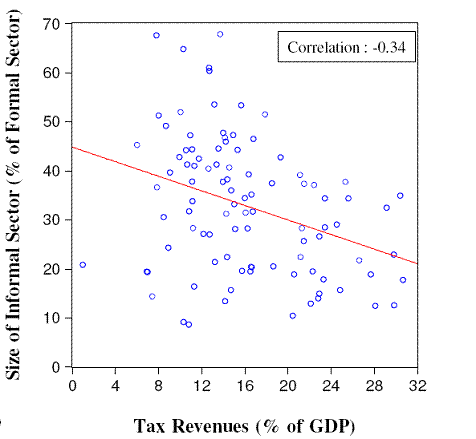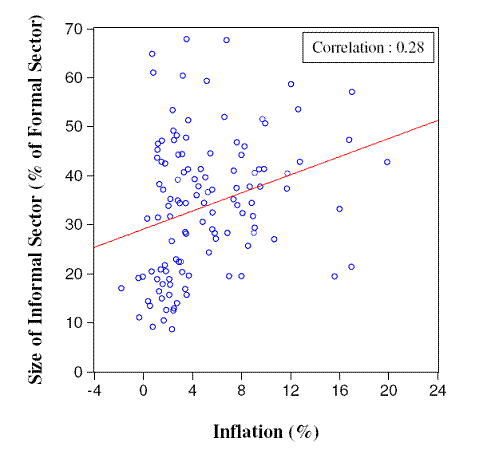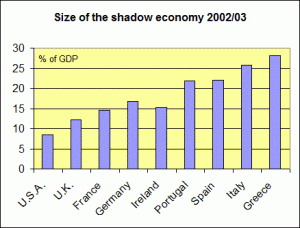University of Maryland Professor Boragan Aruoba (of the Aruoba-Diebold-Scotti Business Conditions Index fame) has an interesting new paper that offers another perspective on the challenges facing Europe.
Aruoba’s paper notes some interesting regularities in a data set of 118 different countries. One measure he looks at is the size of the underground economy in different countries. If you carry out your business in the underground economy, you will benefit by avoiding taxation, but you lose the legal and contract protection that you would have had if you’d instead been working in the formal sector. If only the first effect mattered, you’d expect to see countries with higher tax rates have a greater role for the informal sector. But Aruoba finds just the opposite– the bigger the informal sector, the lower tax receipts as a percent of formal-sector GDP. Aruoba attributes this to the fact that in countries with better legal institutions, the benefits of conducting business above board outweigh the taxation costs, and the governments can afford to raise more of their revenue through traditional taxation.
 |
But how can governments with weaker institutions and a bigger underground economy raise revenue? Even though much of economic activity is outside of the government’s control, the government can still tax that activity by choosing a higher inflation rate. Aruoba argues that this explains why countries with a bigger informal sector often also tend to have higher inflation rates.
 |
Aruoba’s interpretation is that the weaker a country’s institutions, the greater the attractiveness of the informal sector, and the more the government is likely to rely on inflation rather than standard taxes to raise revenue.
I was thinking about these correlations as we all ponder the storm clouds over Europe. Joining a common currency unit means losing the ability to adapt monetary policy to your own country’s cyclical conditions. But it also means surrendering to your neighbors’ long-run mix of formal-sector taxes rather than inflation as a source of government revenue. Here’s an estimate of how the size of the informal sector differs across the countries in the news at the moment.
 |
Tyler Cowen thinks those bars look unsettlingly like dominoes.
When looking at the convergence report of the ECB
“Over the 12-month reference period from April 2009 to March 2010, inflation was very low in the EU as a result of negative global price shocks and the significant downturn in economic activity in most countries. In line with the approach followed in previous reports, the inflation rate for Ireland has been considered an outlier and has therefore been excluded from the calculation of the reference value. Over the reference period average HICP inflation rates were below the reference value in the Czech Republic, Estonia and Latvia, whereas in the other six countries inflation was above the reference value, with the largest deviations being observed in Romania, Hungary and Poland.”
Or P !9 prices
http://www.ecb.int/pub/pdf/stapobo/spb201005en.pdf
Should you try to retreive the inflation statistics, from the Bank of England please follow the instruction and payment request as hereunder:
http://www.bank of England.co.uk/publications/inflationreport/prices.pdf
Not to omit that one should have first perused this thread so much alike the ECB
http://www.bankofengland.co.uk/publications/inflationreport/index.htm
Suspecting that the last official reported inflation as of April 2010 was around 3.4% shall we conclude that there is :
An undereported underground economy in UK and in Ireland
and undereported inflation in Europe?
This would be a difficult time for governments to try to harness income from underground economies as well. In many instances people use them so as not to be so dependent upon their own governments. About the time entitlements for the elderly came to the U.S., any form of barter or other tax free economic activity was discouraged, in part because the U.S. government thought it could more efficiently take the place of such activity. It appeared for decades that indeed the government could provide something better. Only now is this assumption proving to be uncertain.
It’s interesting that he chose tax revenues, versus tax rates, as the measure. It stands to reason that if you have a larger informal sector, your tax receipts will be lower, because a greater percentage of your potential tax base is not paying taxes.
Correlation, therefore, does not imply causation.
If the tax variable is tax revenue/GDP there is a problem with the inference.
You can have high tax rates and a low tax/GDP, because there are strong feedbacks
Adam and MikeB: On page 46 of Aruoba’s paper you’ll find a very similar diagram to the one I display here in which tax rate is used in place of the revenue/GDP ratio.
Adam and MikeB: Just to add to Jim’s (correct) remarks, the causation that was in Jim’s posting was not based on the correlation in the data but the results obtained from an economic model that I build in the paper.
Everyone seems to be off base here, and here’s the real story from the horses mouth.
+++++
Greek Prime Minister George Papandreou declared he is not ruling out taking legal action against U.S. investment banks for their role in creating the spiraling Greek debt crisis.
+++++
My rumor mill sources believe there is more to the story than that. They believe GP has noticed that all money has disappeared from Greece, and Greece Intelligence has reported the money was seen loaded on to a ship leased by Goldman Sachs and the cargo was to be delivered to Area 51 in New Mexico.
Goldman Sachs has admitted to their involvement, but say they are only arranging shipment in this deal, and an unknown client delivered all of Greece’s money to Port of Athens.
Goldman went on to explain that the ship disappeared when sailing thru the Bermuda Triangle, and is presumed lost, for insurance purposes.
The shipment and cargo was insured by AIG, and Goldman is drawing up the claim for the ship and the personal net worth of Greece to be filed with AIG shortly. An investor note will be released at the same time disclosing the above information.
“Aruoba attributes this to the fact that in countries with better legal institutions, the benefits of conducting business above board outweigh the taxation costs, and the governments can afford to raise more of their revenue through traditional taxation.”
How about this for an alternative? It may be a matter of competition. Where an alternative exists to the ‘above-ground’ economy, the government is less able to impose tax on this sector, sort of like illegal bookies may limit the ability of state lotteries to offer crummy odds. Or it may be an artifact of the difficulty in enforcing civil obedience. Where the ‘underground economy’ is larger, this is an indication that the authorities are less able to enforce tax collections, so collections are lower relative to income. This can be because they are unable to collect taxes, or because they recognize they must keep tax rates low or they would put themselves out of business. The size of the underground economy may depend on stuff like proximity to a tax haven, or a tradition of civil disobedience caused by long-term foreign domination, rather than quality of the legal code, per say.
Thanks for posting this. I think this Euro crisis was largely caused by southern European governments failing to adjust from their traditions of funding government spending through inflation. Another very important contributor has been the recently artificially overly liquid sovereign bond markets, disruptively delaying the enforcement of market discipline. The question isn’t why southern Europe’s and Ireland’s cost of borrowing is now suddenly rising, but why it didn’t rise gradually starting much earlier.
Could savings from the underground economy be a source of increased spending in the U.S.?
It would explain the lack of a second dip and why the savings increase didn’t last long? Of course when the savings from under the mattress run out, we could see a down turn in spending.
The correlations are weak and the argument is unpersuasive. The US is an outlier here: low taxes as a % of GDP and a small underground economy and it is a huge outlier.
The argument ignores regulatory burdens, marginal tax rates, distortions in the economy from “tax expenditures” and the effect of inflation on effective tax rates. Much of the underground economy is conducted in dollars, euros, or some other stable currency. Perhaps inflation causes the underground economy to grow.
@ Rebecca: “This would be a difficult time for governments to try to harness income from underground economies as well.”
I think the opposite may turn out to be true, for nations at large. Informal economies can only thrive when tax avoidance is socially accepted.
That acceptance, I reckon, will be dwindling fast in countries like Greece where honest people and businesses are having to make large sacrifices for the public good in the form of higher taxes and lower wages. I think more people will openly disapprove of those who effectively steal from the public, and more people will demand cash receipts and invoices when they conduct business, even if in some cases that means they will be paying more. The government will also become less tolerant of tax evasion, bribes, etc -also in its own dealings with the private sector- because in these times of austerity it can no longer afford the costs either fiscally or morally.
JDH wrote:
If you carry out your business in the underground economy, you will benefit by avoiding taxation, but you lose the legal and contract protection that you would have had if you’d instead been working in the formal sector. If only the first effect mattered, you’d expect to see countries with higher tax rates have a greater role for the informal sector. But Aruoba finds just the opposite– the bigger the informal sector, the lower tax receipts as a percent of formal-sector GDP. Aruoba attributes this to the fact that in countries with better legal institutions, the benefits of conducting business above board outweigh the taxation costs, and the governments can afford to raise more of their revenue through traditional taxation.
Professor,
It appears you are mixing apples and oranges. Tax rates are not the same as tax receipts. You can raise tax rates and either increase or decrease tax receipts depending on economic conditions.
Even though much of economic activity is outside of the government’s control, the government can still tax that activity by choosing a higher inflation rate. Aruoba argues that this explains why countries with a bigger informal sector often also tend to have higher inflation rates.
This appears to be a questionable cause and effect assumption. An economy where the government creates a high inflation rate pushes traders into the informal economy especially the barter economy, to maintain the value of their transactions.
I do not know of many countries that have actively follow an inflationary policy in an effort to raise revenue. Inflation is almost always a by product of excess money creation to allow governments to buy more products or as government attempt to stimulate the economy. Most economists understand that inflation has nasty side effects and so most will not inflate intentionally.
There is also the fact that the government can experience a real loss in purchasing power as the currenty loses its value even if tax receipts increase.
Based on human nature it would seem logical that cause and effect would be inflation drivign more into the underground economy. In other words the increased size of the underground economy is due to the inflation rather than the inflation being caused by the increased size of the underground economy.
Small note because I agree with the work and remember well when Italy jumped ahead of Britain by including its informal economy in the size of its total economy.
Note is that participating in the informal economy doesn’t mean foregoing the attributes of the formal economy. That actually varies substantially from country to country and shouldn’t be assumed as fixed. Some countries have very dysfunctional formal processes and so the informal processes actually provide a better transactional milieu. This is common in S. America and Asia but it’s also found in places like Italy and Spain.
Dan “and more people will demand cash receipts and invoices when they conduct business, even if in some cases that means they will be paying more”
This is a good person’s view of how the world operates. I hope it doesn’t say much about me, but I doubt that it is true. In fact, with rising tax rates, I would expect the opposite to be true, as it increases the incentive to cheat.
You should have posted the diagram on page 46 instead. Rates are more of an independent variable, while receipts/GDP is a significantly dependent variable.